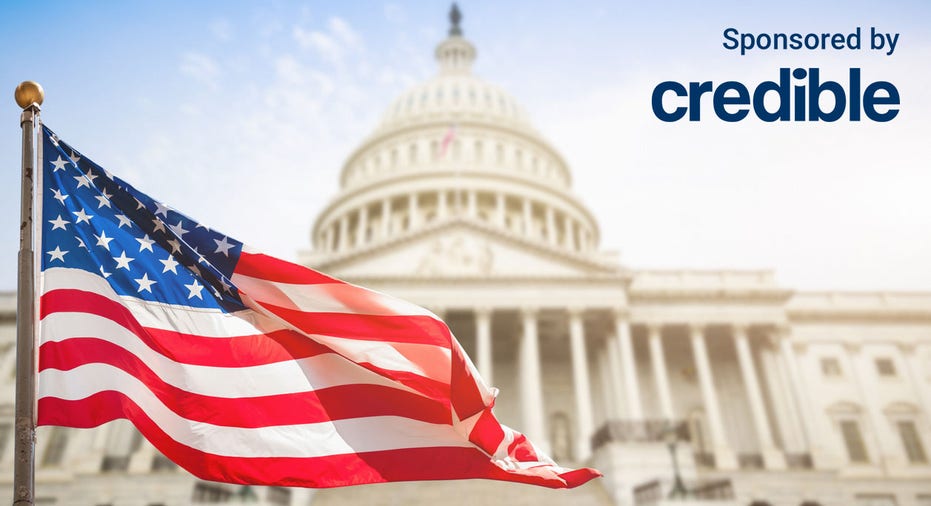State of the Union: Inflation is Biden's 'top priority' as Fed eyes March rate hike
Fighting inflation was a primary focus of Biden's first State of the Union address

President Joe Biden's first State of the Union address leaned heavily on his economic agenda to build "a better America." (iStock)
President Joe Biden confronted a number of issues during his first State of the Union address on March 1, from the ongoing COVID-19 pandemic to the Russian invasion of Ukraine. But the president said his "top priority" is getting inflation under control.
Consumer prices surged 7.5% annually in January, which is the highest rate of inflation in 40 years and well above the Federal Reserve's 2% target. As a result, "many families are living paycheck to paycheck, struggling to keep up with the rising cost of food, gas, housing and so much more," Biden said.
During his speech, Biden unveiled a comprehensive economic plan to fight inflation by cutting the cost of prescription drugs, child care and energy without lowering American wages. He also leaned on tax reform to fund his policies and "make sure corporations and the wealthiest Americans start paying their fair share."
"My plan to fight inflation will lower your costs and lower the deficit."
Keep reading to learn more about the president's plan to combat rising consumer prices, as well as how you can lessen the impact of inflation on your finances. You can visit Credible to compare interest rates on a variety of financial products, from savings accounts to debt consolidation loans.
BIDEN CRITICIZES REPUBLICAN LAWMAKERS FOR 'DANGEROUS' DEBT CEILING INACTION
Amid inflation, Biden touts economic plan to lower everyday costs
The president used his State of the Union address as a platform to advance his economic agenda, saying that his plan would lower prices on energy, and child care and prescription drugs. Here's how the Biden administration plans to cut these costs:
Energy
Biden advocated for doubling America's clean energy production, lowering the price of electric vehicles (EVs) and offering tax credits to weatherize homes and businesses. He estimates that his climate change plan would cut a family's energy costs by an average of $500 annually.
The $1 trillion bipartisan infrastructure bill passed by Congress in 2021 will support Biden's goal of installing 500,000 EV charging outlets by 2030. The Build Back Better Act, which has so far failed to gain enough support in the Senate, would increase the EV tax credit amount to $12,500.
BUILD BACK BETTER WOULD CUT COST OF ROOFTOP SOLAR PANELS BY 30%, WHITE HOUSE SAYS
Child care
Biden's Build Back Better plan would cap the cost of child care to 7% of a family's household income and provide universal pre-K for every 3- and 4-year-old. Additionally, it would extend the expanded child tax credit and monthly payments. A recent study estimates that this would permanently reduce child poverty.
"My plan will cut the cost in half for most families and help parents, including millions of women, who left the workforce during the pandemic because they couldn’t afford child care, to be able to get back to work," Biden said.
YOU COULD GET A SMALLER TAX REFUND IF YOU RECEIVED CHILD TAX CREDIT PAYMENTS IN 2021
Prescription drugs
Biden suggested that lawmakers should cap the cost of insulin at $35 per month and let Medicare negotiate lower prices for prescription drugs. He also wants to make certain changes to the American Rescue Plan permanent — this legislation reduced monthly health insurance premiums, increased tax credits and expanded financial assistance for Affordable Care Act policyholders.
Data shows that medical debt is the leading cause of bankruptcy. If you're struggling with unpaid medical bills, you could consider getting a debt consolidation loan to help repay your debt and save money over time. You can visit Credible to compare rates on debt consolidation loans for free without impacting your credit score.
NAVIENT TO PROVIDE $1.85B IN STUDENT LOAN RELIEF FOR LAWSUIT SETTLEMENT
Fed plays ‘critical role’ in fighting inflation, plans rate hikes
As the president outlined his strategy to stabilize consumer prices during his State of the Union address, he said that the Federal Reserve "plays a critical role in fighting inflation" through its economic policy.
While the Fed kept the benchmark rate to near zero to boost the national economy during the coronavirus pandemic, it plans on implementing multiple rate hikes in 2022 to ease inflation. The central bank still plans on raising interest rates later in March, Fed chair Jerome Powell told lawmakers Wednesday.
News of impending Fed rate hikes has already caused interest rates to rise on a number of financial products, most notably mortgages. Average 30-year mortgage rates have soared from around 3% in November 2021 to nearly 4% currently, according to Freddie Mac.
The Fed's economic policy will also likely cause interest rates to rise on other consumer borrowing products, such as credit cards. This comes at a time when Americans are adding to their credit card debt at a record pace, data shows.
One way to combat rising rates amid inflation is to refinance your high-interest debts at a lower rate. For example, consolidating credit card debt with a fixed-rate personal loan may save some borrowers thousands of dollars over time.
You can learn more about credit card consolidation and compare offers tailored to you by visiting Credible.
HOW TO KNOW IF YOU QUALIFY FOR A STUDENT LOAN TAX DEDUCTION
Have a finance-related question, but don't know who to ask? Email The Credible Money Expert at moneyexpert@credible.com and your question might be answered by Credible in our Money Expert column.




















